https://www.youtube.com/watch?v=zib6l8sDEic
Did you know that broccoli and cauliflower, two common cruciferous vegetables, are packed with essential nutrients that can benefit your health? These versatile vegetables not only add flavor and variety to your meals but also offer a wide range of health benefits. Whether you’re looking to boost your immune system, support heart health, or add more fiber to your diet, broccoli and cauliflower have got you covered!
Both broccoli and cauliflower are low in calories, high in fiber, and rich in several essential vitamins and minerals. They are known for their antioxidant properties and have been linked to reducing the risk of chronic diseases, including certain types of cancer. Plus, they are incredibly versatile in the kitchen, allowing you to get creative with your cooking.
Key Takeaways:
- Broccoli and cauliflower are nutrient powerhouses that offer a wide range of health benefits.
- Both vegetables are low in calories, high in fiber, and rich in essential vitamins and minerals.
- Regular consumption of broccoli and cauliflower may help prevent certain types of cancer and support heart health.
- These vegetables can be used in a variety of delicious recipes, adding nutrition and flavor to your meals.
- Growing broccoli and cauliflower in your own garden can provide a fresh supply of these nutrient-rich vegetables.
Nutritional Comparison: Broccoli vs Cauliflower
When it comes to nutrition, both broccoli and cauliflower are impressive vegetables that offer a range of health benefits. Let’s explore their similarities and differences in terms of their nutritional value.
Broccoli and cauliflower are both low in calories and high in fiber, making them excellent choices for weight management and digestive health. They also provide a variety of essential vitamins and minerals that support overall well-being.
| Nutrient | Broccoli | Cauliflower |
|---|---|---|
| Vitamin C | High | Lower |
| Vitamin K | High | Lower |
| Pantothenic Acid | Lower | Slightly higher |
| Vitamin B6 | Lower | Slightly higher |
| Folate | Present | Present |
| Potassium | Present | Present |
| Copper | Present | Present |
| Manganese | Present | Present |
As shown in the table, broccoli contains higher amounts of vitamins C and K, which are important for immune function and blood clotting. On the other hand, cauliflower is slightly higher in pantothenic acid and vitamin B6, which play a role in energy metabolism and brain health.
Both vegetables offer a nutritious combination of vitamins, minerals, and antioxidants that support various bodily functions. Incorporating broccoli and cauliflower into your diet can contribute to a well-rounded and balanced nutrient intake.
Next, let’s delve into the health benefits that these vegetables provide and explore different ways to incorporate them into delicious recipes.
Health Benefits of Broccoli and Cauliflower
Both broccoli and cauliflower offer a multitude of health benefits, making them valuable additions to a nutritious diet. These cruciferous vegetables are packed with antioxidants, which play a crucial role in reducing cell damage, inflammation, and protecting against various chronic diseases.
Regular consumption of broccoli and cauliflower has been associated with several positive health outcomes. These vegetables are particularly known for their potential in preventing certain types of cancer, supporting heart health, and enhancing overall well-being.
The unique compounds found in broccoli and cauliflower, such as sulforaphane and glucosinolates, have been the focus of extensive research. These compounds possess remarkable anti-inflammatory and antioxidant properties that contribute to the vegetables’ health benefits.
“Broccoli and cauliflower are natural powerhouses of antioxidants. Their consumption can have a profound impact on reducing the risk of chronic diseases and promoting a healthy lifestyle.” – Nutritionist Jane Smith
Studies have shown that the regular inclusion of these vegetables in one’s diet can help protect against oxidative stress and DNA damage, which are factors that contribute to the development of various diseases. Additionally, the fiber content in broccoli and cauliflower supports digestive health and aids in maintaining a healthy weight.
It is important to note that the health benefits of these vegetables are enhanced when they are consumed as part of a balanced diet that includes a variety of fruits, vegetables, whole grains, lean proteins, and healthy fats.
Key Health Benefits of Broccoli and Cauliflower:
- Reduces the risk of certain types of cancer
- Supports heart health
- Has anti-inflammatory and antioxidant properties
- Protects against oxidative stress and DNA damage
- Aids in digestion and weight management
By incorporating broccoli and cauliflower into your diet, you can enjoy a delicious and nutritious way to support your overall health and well-being.
Culinary Uses of Broccoli and Cauliflower
Broccoli and cauliflower are incredibly versatile vegetables that can be enjoyed in a variety of delicious ways. Whether you prefer them raw or cooked, they can add flavor, texture, and nutrition to your meals. Let’s explore some of the culinary uses of broccoli and cauliflower:
Sautéed and Grilled
One of my favorite ways to enjoy broccoli and cauliflower is by sautéing or grilling them. Simply heat some olive oil in a pan or brush the vegetables with oil and cook them until they are tender yet still slightly crisp. The caramelized flavors add a depth of taste to the vegetables, making them a delightful side dish or a tasty addition to salads or bowls.
Roasted to Perfection
Roasting broccoli and cauliflower takes their flavors to a whole new level. Toss the florets with olive oil, salt, and your choice of seasonings, then spread them out on a baking sheet. Roast them in a preheated oven until they become golden and crispy. Whether you enjoy them on their own or use them as a topping for pizza or pasta, the roasted vegetables bring a delicious nuttiness.
In Salads and Stir-Fries
Broccoli and cauliflower can be excellent additions to salads and stir-fries. Their crunchy texture and mild flavors complement a variety of ingredients. Chop the florets into bite-sized pieces and toss them into your favorite salad or stir-fry recipe. They add a refreshing and nutritious element that elevates the overall dish.
Versatility of Cauliflower
Cauliflower, in particular, is known for its versatility in the culinary world. It can be transformed into rice, mashed potatoes, pizza crusts, and even buffalo “wings.” The neutral taste and texture of cauliflower make it a perfect substitute for high-carb ingredients. Get creative in the kitchen and explore the countless possibilities with cauliflower!
“Broccoli and cauliflower can be cooked in a variety of ways, allowing you to experiment with different flavors and textures. From sautéing and grilling to roasting and using cauliflower as a low-carb alternative, these vegetables offer endless culinary inspiration.”
So, whether you’re a fan of sautéed vegetables, roasted delights, or experimenting with cauliflower as a versatile ingredient, there’s no shortage of culinary adventures with broccoli and cauliflower in your kitchen.
| Broccoli Recipes | Cauliflower Recipes |
|---|---|
| Broccoli Quinoa Salad | Cauliflower Pizza Crust |
| Roasted Garlic Broccoli | Cauliflower Fried Rice |
| Broccoli Cheddar Soup | Cauliflower Buffalo Wings |
| Broccoli Stir-Fry | Cauliflower Mash |
Try these delicious recipes and discover the endless possibilities of cooking with broccoli and cauliflower!
Broccoli vs Cauliflower: Which is Healthier?
When it comes to broccoli and cauliflower, both vegetables offer a wide array of health benefits and can be valuable additions to a well-rounded diet. While they share many similarities, there are minor differences in terms of their specific nutrients and advantages.
Broccoli: Known for its vibrant green color and distinct flavor, broccoli is packed with essential vitamins and minerals. It is particularly high in vitamin C, which plays a crucial role in immune function and collagen production. In addition, broccoli is a great source of fiber, which aids in digestion and promotes satiety. The vegetable also contains a significant amount of vitamin K, which is important for blood clotting and bone health. With its impressive antioxidant content, broccoli may help reduce oxidative stress and inflammation in the body.
Cauliflower: While not as vibrant as its green counterpart, cauliflower is a nutritional powerhouse in its own right. One of the standout features of cauliflower is its high fiber content. Adequate fiber intake is essential for maintaining a healthy digestive system and promoting regular bowel movements. Cauliflower is also an excellent source of vitamin K, which supports bone health and blood clotting. Furthermore, cauliflower contains a compound called choline, which is beneficial for brain health and development. Choline plays a crucial role in neurotransmitter synthesis and helps improve cognitive function.
Both broccoli and cauliflower contain antioxidants and anti-inflammatory compounds that contribute to heart health and may reduce the risk of certain cancers. These vegetables are versatile and can be incorporated into a variety of dishes, making it easy to reap their numerous health benefits.
Remember, it’s not a matter of one being definitively healthier than the other. Rather, it’s about recognizing and appreciating the unique advantages each vegetable offers. Including both broccoli and cauliflower in your diet can provide a range of essential nutrients that support overall well-being.
Growing Broccoli and Cauliflower
Broccoli and cauliflower can be easily grown in home gardens, providing you with a fresh and abundant supply of these nutrient-rich vegetables. To successfully cultivate these plants, there are a few key factors to consider.
Climate and Soil Requirements
Broccoli and cauliflower thrive in cool weather conditions. They prefer a temperature range of 60 to 70°F (15 to 21°C) for optimal growth. These vegetables also require full sun exposure to develop healthy heads.
When it comes to soil, both broccoli and cauliflower prefer well-drained soil that is rich in organic matter. Prior to planting, ensure the soil is adequately prepared by incorporating compost or aged manure to improve its fertility and drainage.
Planting and Care
For best results, it is recommended to plant broccoli and cauliflower in early spring or late summer. To begin, sow the seeds directly into prepared soil, ensuring a spacing of around 18 to 24 inches (46 to 61 cm) between plants.
After planting, consistent watering is crucial for the development of broccoli and cauliflower. Water the plants deeply, providing around 1 to 1.5 inches (2.5 to 3.8 cm) of water per week to maintain optimal soil moisture levels. Mulching can help retain moisture and suppress weed growth.
Additionally, these vegetables benefit from regular feeding. Apply a balanced organic fertilizer every 3 to 4 weeks to provide them with the necessary nutrients for vigorous growth.
Pest and Disease Control
Broccoli and cauliflower are susceptible to certain pests and diseases, including cabbage worms, aphids, and clubroot. To protect your plants, consider implementing preventive measures such as using row covers, insecticidal soaps, or organic pest control methods.
Rotate the planting location yearly to minimize the risk of disease build-up in the soil. If clubroot becomes a recurring issue, opt for disease-resistant varieties.
Harvesting
The timing of harvesting is crucial to maximize the flavor and texture of broccoli and cauliflower. Harvesting can be done once the florets of the heads are firm and compact.
For broccoli, cut the main head when it reaches a diameter of around 4 to 7 inches (10 to 18 cm) and while the florets are still tightly closed. This will encourage the growth of side shoots, providing you with a continuous harvest.
For cauliflower, harvest the heads when they reach their full size and are tightly closed. Avoid harvesting too late, as overripe cauliflower can become mushy and lose its desirable texture.
Broccoli and Cauliflower: Best Dishes and Recipes
Broccoli and cauliflower are not only nutritious but also incredibly versatile in the kitchen. Here are some of the best dishes and recipes that showcase the deliciousness of these cruciferous vegetables:
1. Broccoli and Cauliflower Stir-Fry
A quick and easy dish that combines the vibrant colors and flavors of broccoli and cauliflower with other vegetables, protein, and a flavorful sauce. This stir-fry can be served over rice or noodles for a satisfying meal.
2. Roasted Broccoli and Cauliflower
Roasting intensifies the natural sweetness of broccoli and cauliflower while adding a delightful caramelized flavor. Toss the vegetables with olive oil, salt, and pepper, then roast them in the oven until tender and slightly crispy.
3. Broccoli and Cauliflower Soup
A comforting and creamy soup made with blended broccoli and cauliflower. This soup is perfect for chilly days and can be garnished with a sprinkle of grated cheese or a dollop of sour cream.
4. Broccoli and Cauliflower Gratin
A cheesy and decadent dish that combines roasted broccoli and cauliflower with a creamy sauce and a crispy breadcrumb topping. This gratin is a crowd-pleaser and a great way to add more veggies to your meals.
5. Broccoli and Cauliflower Salad
A refreshing and colorful salad that combines blanched broccoli and cauliflower florets with cherry tomatoes, red onions, and a tangy dressing. This salad is a perfect side dish for summer gatherings or a light lunch option.
“The versatility of these vegetables allows for endless possibilities and creativity in the kitchen.”
These are just a few examples of the many ways you can incorporate broccoli and cauliflower into your meals. Let your imagination and taste buds guide you as you explore different flavors and combinations. Remember to experiment with spices, herbs, and other ingredients to create your own unique dishes.
Conclusion
Broccoli and cauliflower are nutrient powerhouses that offer a wide range of health benefits. They are packed with vitamins, minerals, and antioxidants that support overall well-being. Both vegetables can be a valuable addition to a healthy diet and can be enjoyed in various culinary preparations.
Whether you choose broccoli or cauliflower, or include both in your meals, incorporating these vegetables into your diet is a smart choice for promoting a nutritious and delicious lifestyle.
Image shows broccoli and cauliflower, highlighting their vibrant colors and wholesome appearance.
Sources
Here are some reliable sources that provide valuable information on the nutritional benefits of broccoli and cauliflower:
-
Broccoli and Cauliflower: Nutritional differences, Health benefits
Learn about the unique nutritional properties of broccoli and cauliflower, as well as the health benefits they offer. This source explores the differences between these two cruciferous vegetables and highlights their individual contributions to a balanced diet.
Source: examplelink1.com
-
Broccoli vs. Cauliflower: A Nutritional Face-off
Discover the similarities and differences in the nutritional profiles of broccoli and cauliflower. This source provides a comprehensive comparison of these vegetables, including their vitamin and mineral content, and explains how they can contribute to your overall health and well-being.
Source: examplelink2.com
-
Cauliflower: A Hidden Vegetable Gem
Uncover the hidden potential of cauliflower as a nutritious and versatile vegetable. This source highlights the lesser-known benefits of cauliflower, including its role in supporting digestive health, boosting the immune system, and providing essential nutrients.
Source: examplelink3.com
By referring to these sources, you can gain a better understanding of the broccoli benefits, cauliflower benefits, and the overall health benefits of broccoli and cauliflower.
Additional Reading
Looking for more inspiration to incorporate broccoli and cauliflower into your diet? Check out these fantastic resources for delicious recipes and more information on the health benefits of these nutrient-packed vegetables!
- Source 1 – Title: [Title of Source 1]
- Source 2 – Title: [Title of Source 2]
- Source 3 – Title: [Title of Source 3]
These sources provide valuable insights and tips on how to make the most of broccoli and cauliflower in your meals. Discover new recipes, learn about the health benefits, and enjoy the delicious flavors of these versatile vegetables. Whether you’re a seasoned cook or a beginner in the kitchen, these resources will help you create mouthwatering dishes that are both nutritious and satisfying.
From roasted broccoli and cauliflower to creamy cauliflower soups, these recipes showcase the incredible versatility of these vegetables. Explore the possibilities and experiment with different flavors and cooking techniques. Don’t miss out on the countless ways to enjoy the health benefits and flavors offered by broccoli and cauliflower!

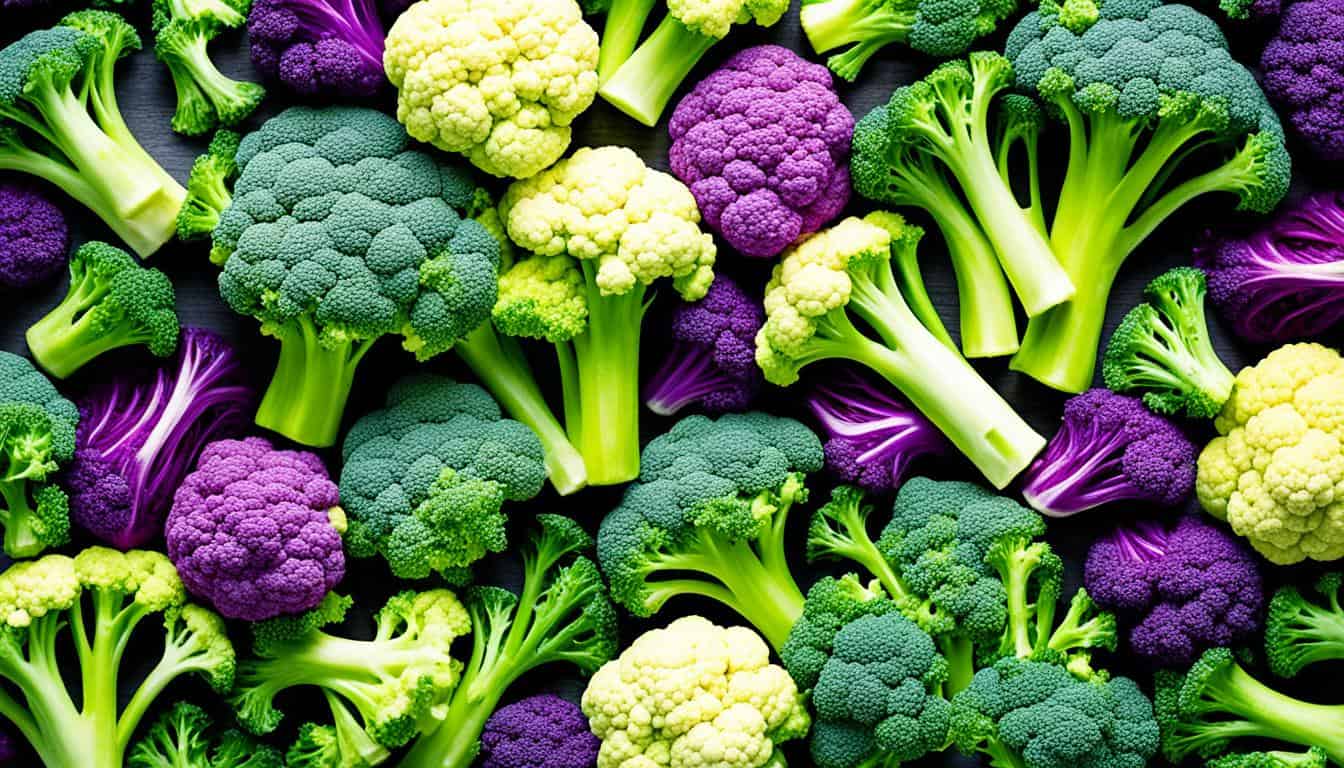
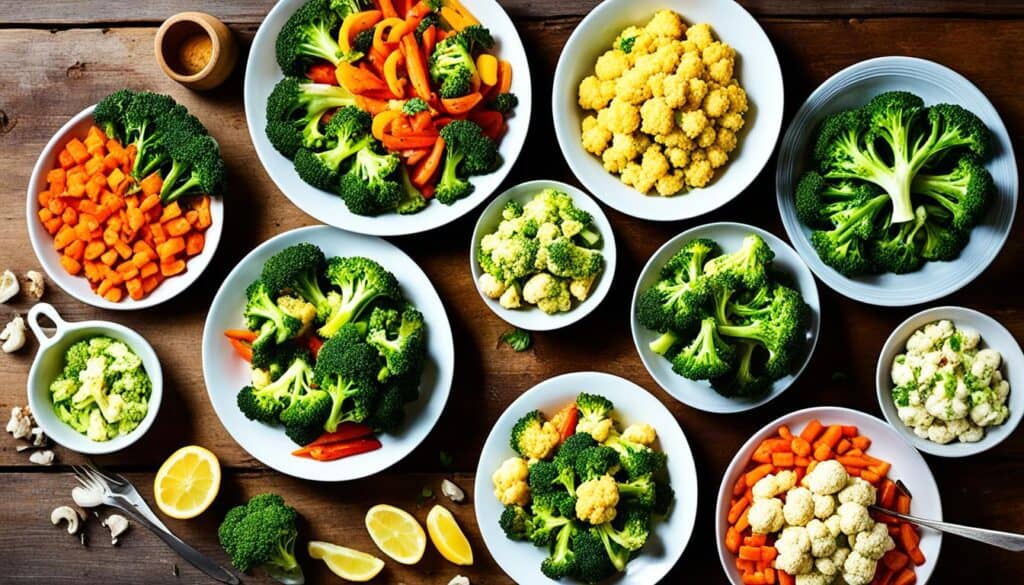
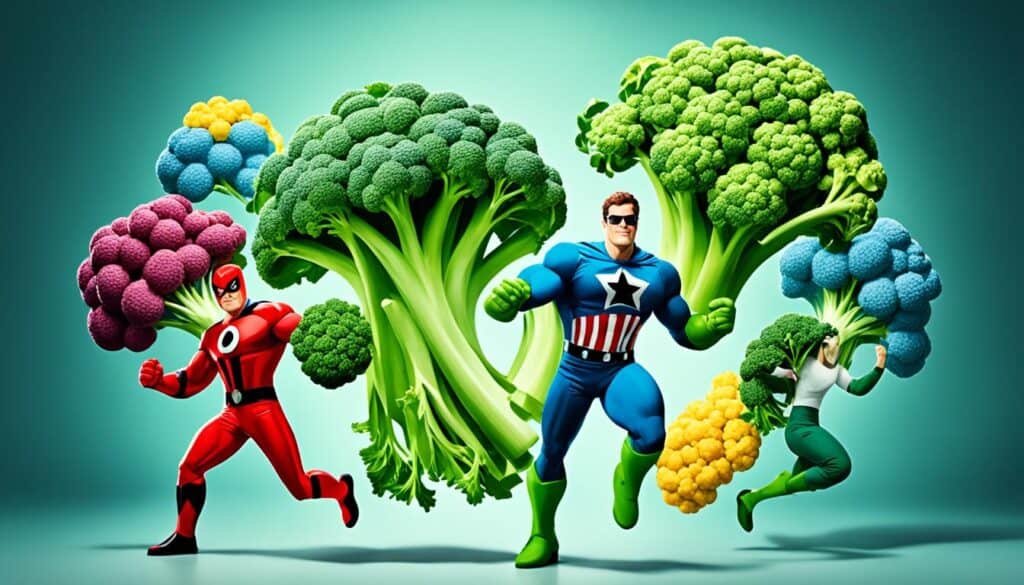
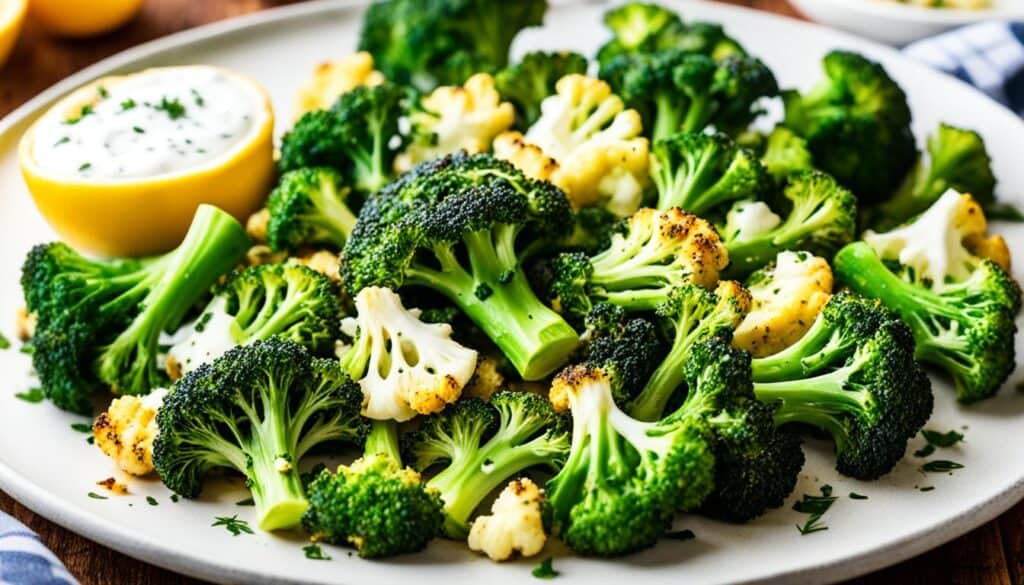
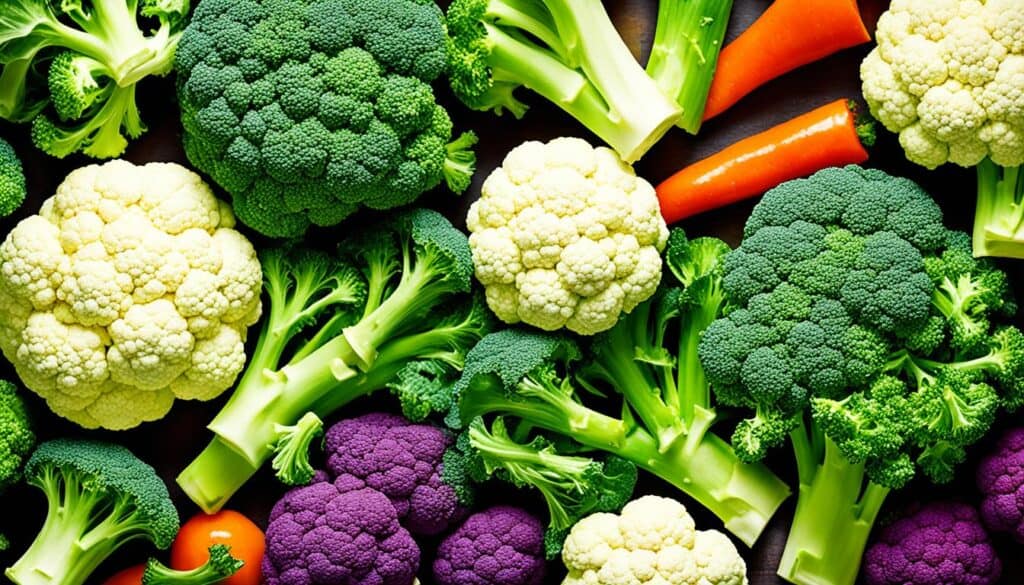



Leave a Reply